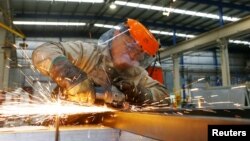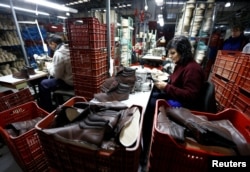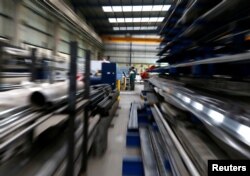Since taking office in December, President Mauricio Macri has quickly ticked off a long-held wish-list of Argentina's manufacturers - lifting tough capital controls, easing import restrictions and freeing up access to dollars.
But his policies have yet to lead to a recovery in manufacturing. Initial optimism over the new business-friendly government has met the tough realities of stubbornly high inflation, an economy stumbling towards recession and job losses.
"We were selling around 28,000 pairs [of shoes] per month and then in October last year it suddenly dropped to 18,000. We thought it would only last a few months, but the situation still hasn't changed," said Jorge Boris, vice president and partner at security footwear maker Boris Hnos, which makes steel-toe shoes used in construction and other industries.
The shoemaker, which employs around 70 workers on the outskirts of Buenos Aires, is not alone. Industrial output contracted a sharper-than-expected 6.7 percent in April from a year earlier, the newly revamped Indec statistics agency said this week.
Boosting factory output and turning around Argentina's economic fortunes are key to Macri's political fortunes.
He has promised to reverse years of protectionist economic policies under his leftist predecessor Cristina Fernandez but he could face labor unrest and an aggressive opposition in Congress and on the streets if he cannot quickly deliver growth.
"Up until now we haven't seen a change with this government ... The economic situation in the country is bad. People have less purchasing power and companies are also doing poorly," said Boris.
Macri's policies have been hailed by investors as a strong start to opening up the economy, but they have also swelled the ranks of the poor as a currency devaluation sparked a sharp hike in inflation and the government hiked utility rates and cut generous subsidies for gas and water.
At least, manufacturers say, they can finally import what they need. Under Fernandez, cumbersome quotas hampered the import of key components and disrupted factory production lines.
"As of December, we haven't had any problems with importing finished cars or auto parts," said an executive at Argentina's industry automobile association, who asked not to be named.
But that is of limited use if there is little demand. Added to the economic woes at home is a steep recession in top trade partner Brazil, where nearly half of Argentina's manufactured goods are shipped.
"The problem is no longer about access to dollars or a simplified import regime for auto parts, it's a question of activity and of where to sell what we produce," said the industry executive.
Argentina's vehicle production in the first quarter of 2016 dropped 18 percent on the year.
Argentina's auto makers have responded by looking to new markets, such as Colombia. But half of Argentine-made cars are shipped to Brazil so new markets will only partially compensate for the shortfall.
Light at End of Tunnel
Macri promises that Argentina's return to global debt markets after it paid off 'holdout' creditors, 14 years after a massive sovereign debt default that triggered a mass exit of investors and a wave of litigation, will help draw a wave of foreign investment.
And many business owners remain positive on the long term, saying Macri's policies have brought greater transparency for investment decisions.
"The private sector is now talking to the public sector and that gives you predictability ... it allows you to plan out the purchases you're going to make in far-away markets," said Ruben Oscar Garcia, secretary of import industry group Cira.
Small- and medium-sized companies that make up an important part of the manufacturing sector rely on "expectations and gut feeling" when making investment decisions, said Jorge Gottert, president of manufacturing industry group Carmahe.
"And there has been a radical change in that sense ... we're convinced that the measures this government is taking are correct."
Gottert said he expects a manufacturing recovery to begin in the second half of this year and a surge in 2017.
Another Macri business-friendly move was to cut the tax on shipments of soybeans, Argentina's main cash crop, from 35 percent to 30 percent days after assuming power, while scrapping export taxes on corn and wheat. He plans further cuts.
As a result, increased activity in the grains sector during the second half of the year should prompt a ripple effect in the economy, feeding into manufacturing, said Marcelo Quistorp, president of Tauro, which manufactures welding equipment in the grains export hub Rosario.
"Right now we're 20 percent below where we'd like to be production wise ... but we're hopeful this is going to take off.
We can't get rid of our workers because we risk having to train new ones when it does," he said.
But not everyone is convinced the economy will turn around this year.
"Macri is doing a lot of good things, and it's right to be optimistic about the medium term prospects ... but the more painful cuts to social welfare spending, which will be needed to bring the fiscal deficit down, are yet to be implemented," said Edward Glossop, emerging markets economist at Capital Economics.
"The second half of the year if anything we would expect to be even weaker than the first half of the year, not stronger," he added.













